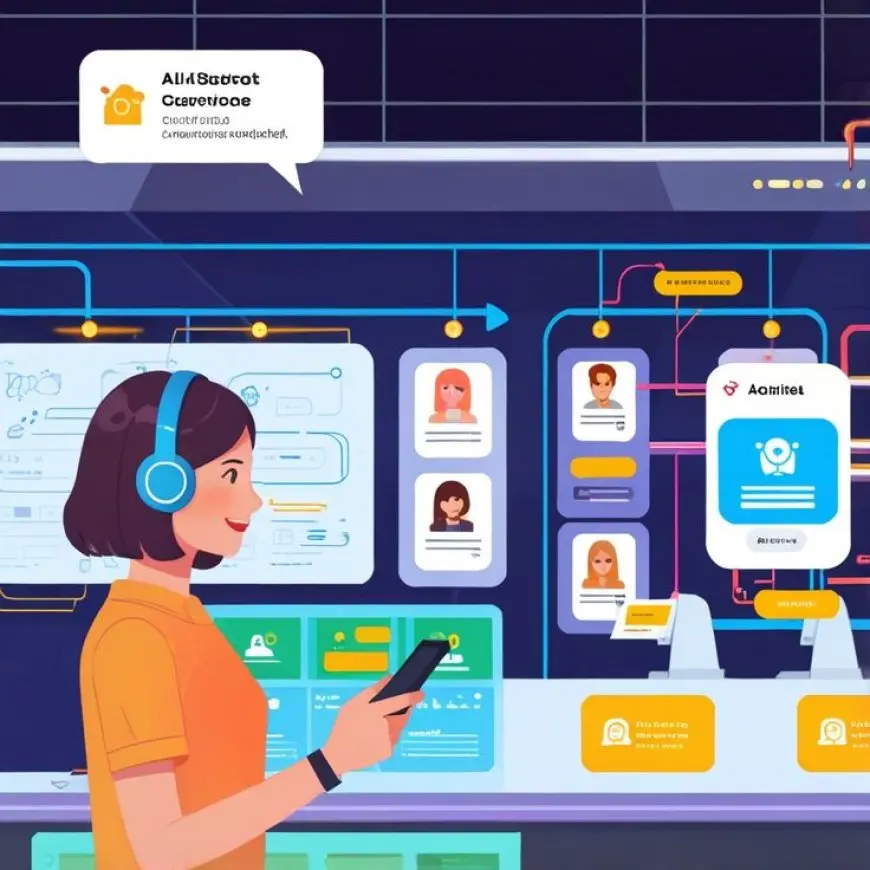"How AI is Shaping Customer Service"
"How AI is Shaping Customer Service"

Artificial Intelligence (AI) is redefining customer service, transforming how businesses interact with their customers and address their needs. By integrating AI technologies, companies can offer faster, more efficient, and personalized experiences. This innovation not only enhances customer satisfaction but also optimizes operational efficiency, making AI an essential component of modern customer service strategies.
The Role of AI in Customer Service
AI leverages machine learning, natural language processing (NLP), and automation to streamline customer interactions. It enables businesses to analyze data, understand customer behavior, and predict future needs with remarkable precision. Through tools like chatbots, voice assistants, and sentiment analysis, AI ensures that customer service is more responsive and tailored than ever before.
Key Applications of AI in Customer Service
Chatbots and Virtual Assistants
AI-powered chatbots and virtual assistants are among the most visible applications of AI in customer service. These tools can handle a wide range of customer inquiries, from answering frequently asked questions to resolving technical issues. By operating around the clock, chatbots ensure that customers receive instant support, improving response times and reducing the workload on human agents.
Virtual assistants, such as those used in online retail or banking, can guide users through processes like placing orders, tracking shipments, or managing accounts. Their ability to learn from interactions allows them to provide increasingly accurate and relevant assistance over time.
Personalized Customer Experiences
AI excels in analyzing customer data to deliver personalized experiences. By tracking purchase history, browsing behavior, and preferences, AI can recommend products, services, or solutions tailored to individual needs. This level of personalization strengthens customer loyalty and drives sales by making interactions feel more relevant and engaging.
Sentiment Analysis
AI-powered sentiment analysis tools can assess the tone and emotion behind customer communications, whether through text, voice, or social media. This insight helps businesses understand how customers feel about their products, services, or interactions. Companies can use this information to address dissatisfaction proactively, celebrate positive feedback, and improve overall customer relations.
Automated Workflows
AI streamlines customer service workflows by automating repetitive tasks. For example, it can route inquiries to the appropriate department, generate support tickets, or even resolve simple issues without human intervention. This efficiency allows customer service teams to focus on more complex and value-driven tasks.
Voice Recognition and IVR Systems
Advanced voice recognition technologies have significantly improved Interactive Voice Response (IVR) systems. AI-driven IVR systems can understand and process natural language, enabling customers to navigate phone-based support with ease. This technology reduces frustration and enhances the overall customer experience.
Proactive Customer Support
AI enables businesses to anticipate and address customer needs before they arise. Predictive analytics, powered by AI, can identify patterns that indicate potential issues, such as a product requiring maintenance or a subscription nearing renewal. Proactive support ensures that customers feel valued and reduces the likelihood of problems escalating.
Multilingual Support
AI-powered language translation tools allow businesses to provide seamless support in multiple languages. This capability expands accessibility and ensures that customers from diverse backgrounds can communicate effectively with support teams.
Training and Support for Human Agents
AI is not just for direct customer interactions; it also supports human agents by providing real-time insights and recommendations. AI-powered tools can analyze customer inquiries and suggest appropriate responses or solutions, helping agents resolve issues more efficiently. Additionally, AI can be used to train agents by identifying skill gaps and providing targeted learning resources.
Benefits of AI in Customer Service
- Increased Efficiency: AI reduces response times and automates routine tasks, allowing teams to handle higher volumes of inquiries.
- Cost-Effectiveness: By automating repetitive processes, businesses can lower operational costs while maintaining high service standards.
- Scalability: AI systems can handle large volumes of interactions simultaneously, ensuring consistent service during peak times.
- Improved Accuracy: AI eliminates human errors and provides consistent, reliable responses.
- Customer Insights: AI analyzes data to uncover trends and preferences, enabling businesses to make informed decisions.
Challenges and Considerations
Despite its advantages, implementing AI in customer service comes with challenges:
- Data Privacy: Handling large volumes of customer data raises concerns about security and compliance. Businesses must ensure that AI systems adhere to strict data protection standards.
- Lack of Human Touch: While AI excels at efficiency, some customers prefer human interaction, especially for complex or sensitive issues. Striking the right balance between AI and human support is crucial.
- Implementation Costs: Developing and integrating AI solutions can require significant investment, making it essential for businesses to plan carefully.
- Bias and Accuracy: AI systems must be trained to avoid biases and provide fair and accurate responses across diverse customer groups.
The Future of AI in Customer Service
The role of AI in customer service will continue to grow as technology advances. Innovations like emotional AI, which can detect and respond to customer emotions, and adaptive learning systems that improve autonomously, will further enhance the customer experience.
Moreover, the integration of AI with other emerging technologies, such as augmented reality (AR) and the Internet of Things (IoT), will enable new forms of customer engagement. For example, AI-powered AR tools could guide customers through product assembly or troubleshooting in real-time.
AI is transforming customer service, delivering faster, more personalized, and efficient solutions to meet evolving consumer expectations. While challenges remain, the potential for AI to enhance customer experiences and streamline business operations is undeniable. By embracing AI responsibly and strategically, businesses can build stronger relationships with their customers and stay ahead in an increasingly competitive landscape.







